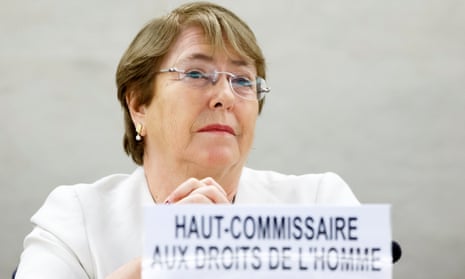Australia’s offshore processing immigration regime is “an affront to the protection of human rights”, the new UN new human rights chief has said in an excoriating maiden speech reflecting on the state of rights globally.
In her first address to the human rights council, Michelle Bachelet, the former president of Chile, said the council had a responsibility to speak out against human rights violations without fear or favour, “regardless of sex, gender identity, race or ethnicity, religion, disability or migration status”.
“Irrespective of the type of political regime in a given country, the human rights council has the duty to advocate … in upholding all rights.”
Australia is one of 47 countries that sits on the powerful UN council, based in Geneva. It won a seat after a years-long, multimillion-dollar diplomatic- and aid-backed campaign for election. Bachelet is the new UN high commissioner for human rights, following the Jordanian Zeid Raad Al Hussein.
Focusing heavily on migration in her address, Bachelet said that historically people had always moved “in search of hope and opportunities”.
“Erecting walls; deliberately projecting fear and anger on migrant communities; denying migrants fundamental rights by limiting their right to appeal, curtailing their right to non-refoulement, separating and detaining families, and cutting integration programmes: such policies offer no long-term solutions to anyone – only more hostility, misery, suffering and chaos.”
Bachelet said the newly concluded global compact on migration could help countries cooperate on migration and would protect the rights of some of the world’s most vulnerable.
“The decision by the United States and Hungary to refuse to sign the compact is deeply regrettable,” she said. “Australia, a member of this council that has suggested it might withdraw, should join the consensus of the global community, adopt the compact and revise the country’s policies with respect to people arriving at its borders without a visa.”
But her fiercest criticism was reserved for Australia’s offshore immigration regime, on the remote islands of Nauru and Manus in Papua New Guinea.
“The current offshore processing centres are an affront to the protection of human rights,” Bachelet said.
Offshore processing – and the human rights abuses that have been consistently documented within the regime – came to renewed international attention last week when Nauru hosted the Pacific Islands Forum. The situation there of children is especially acute, with more than half of the roughly 100 children held on the island dangerously ill and suffering conditions that cannot be treated there.
In her speech, Bachelet also named several other countries now serving on the human rights council.
She cited widespread violence in the Democratic Republic of the Congo and the repression of women’s rights campaigners in Saudi Arabia.
She also condemned new legislation passed in Hungary which allows authorities to arrest any lawyer, volunteer or adviser helping a person make an asylum claim.
And Bachelet said while the US – which was on the council until it withdrew earlier this year – had “halted the unconscionable practice of separating immigrant children”, it had still not reunited more than 500 children with their parents.
Daniel Webb, from the Human Rights Law Centre, said Australia could not credibly advocate for human rights causes around the world while abusing human rights in its own migration regime.
“Our government masquerades as respecting human rights at the UN but its hypocrisy is being called out at the highest level – no government can truly stand for human rights while choosing to destroy the lives of children,” Webb told the Guardian from Geneva, where he is an observer of the council sessions.
Bachelet, the only woman to serve as president of Chile, has previously been a forced migrant to Australia. In 1974 her father, a general in the Chilean army, was kidnapped and tortured by the regime of Augusto Pinochet and ultimately died as a result. His then 20-year-old daughter was also abducted and tortured, but ultimately fled, escaping to Sydney, where she lived for five months with her brother, an Australian citizen.
